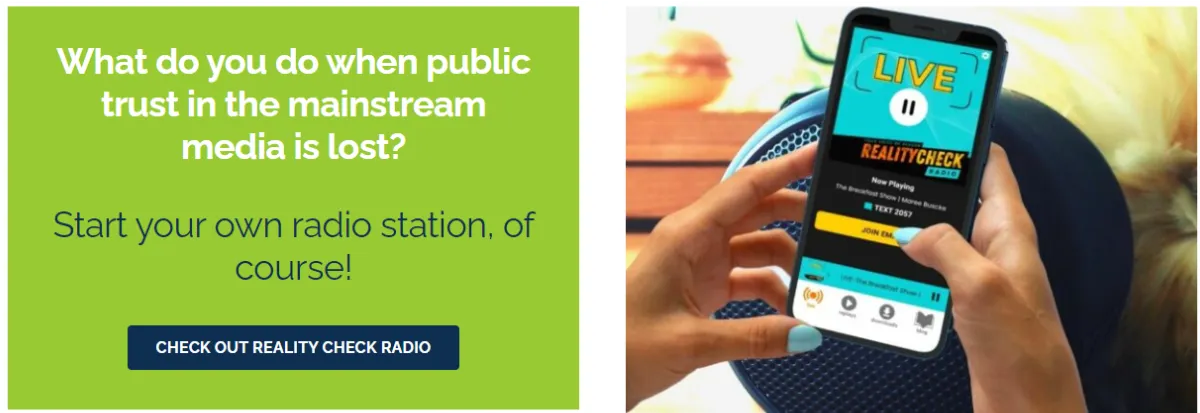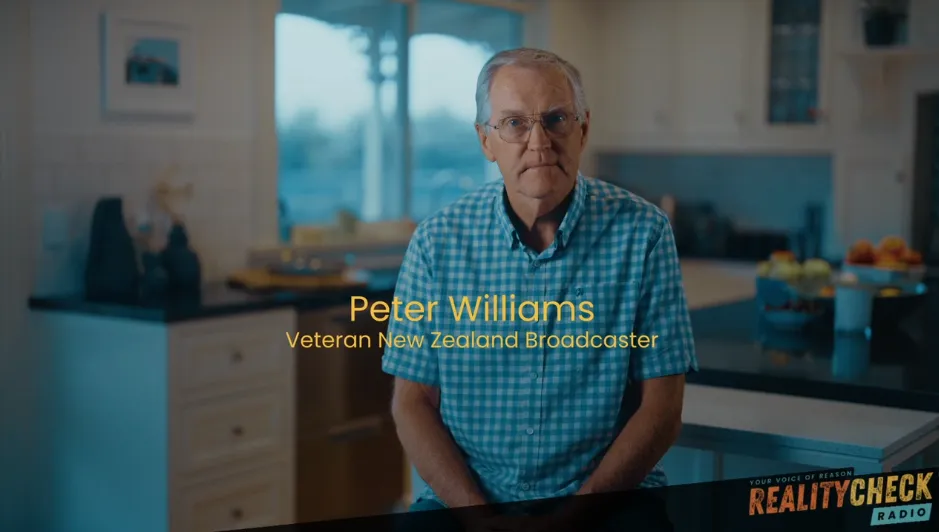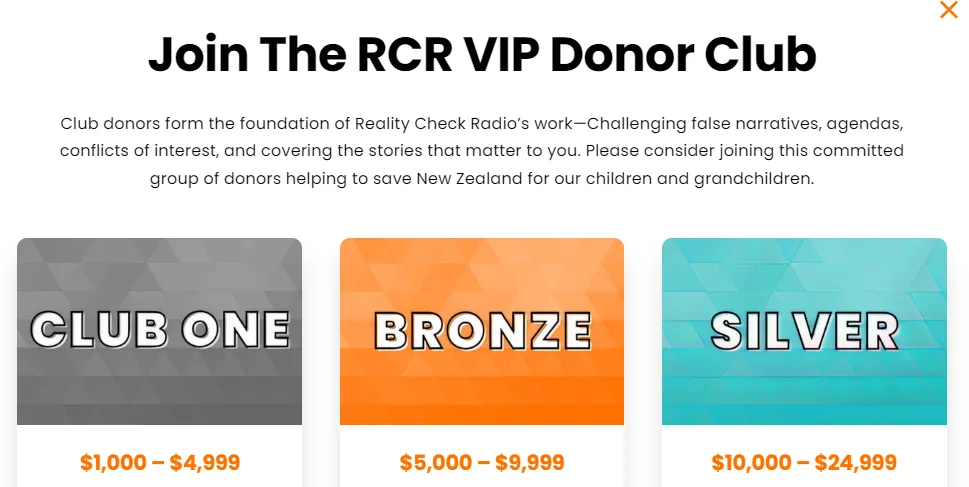RCR gets a reality check?
Craig Shearer - 15th April 2024

This past Tuesday the NZ internet was confronted with the sad news that Reality Check Radio - RCR as it’s known - was “off the air”. On Tuesday morning, arriving in my mailbox that I use to monitor the thing, came this news:
![]()
Reality Check Radio is an online-only media outlet run by Voices for Freedom, a “freedom” group that sprung up near the beginning of the Covid pandemic.
Voices for Freedom, itself, was started by three “ordinary” mothers, who happened to be anti-vaxxers. VFF was very active throughout the pandemic, opposing all sorts of common-sense measures, and spreading various conspiracy theories and weird ideas related to Covid - things like the vaccines being dangerous (for various reasons), that lockdowns were the government being tyrannical, that the pandemic was all planned, and the like. And while VFF denied they started the occupation of the NZ Parliament grounds in February 2022, they were undoubtedly supportive of it.
One of the main “attacks” by VFF was on the “mainstream” media - the MSM - claiming that they only promoted government views about the pandemic, and refused to give oxygen to alternate voices such as people claiming to be harmed by the vaccine, or those who promoted the view that vaccine mandates were being used to control the population.

Attacks on the mainstream media inevitably lead to the establishment of alternative media outlets, of which many sprung up. We saw the crazy CounterSpin Media, which promotes wild conspiracy theories, and a ton of videos appearing on YouTube. Once YouTube cleaned up its act and got rid of such misleading and dangerous content, it migrated to other less-reputable video outlets such as BitChute, Rumble, and Odysee. But what was needed was a proper alternative to the mainstream media, that people could consume like turning on the talkback radio. From this idea sprung Reality Check Radio, derisively known by other names, such as Rabbit Hole Radio.
RCR had been broadcasting for a little over a year, announcing their presence with a banner flown in the sky proclaiming: “Reality Check Radio - RIP Woke Media”. The channel has been available via streaming over the internet since then.
The programming for RCR has consisted of a lot of topics that would be considered conspiracy adjacent, or even outright conspiracies. The hosts generally promote conspiracy theories and attitudes which question the official narrative or well-established science.
While they started out as anti-vaxxers, their topics have broadened to being “anti-woke”, anti-climate-change, and covering topics such as fluoridation, digital currencies, gender identity and 15 minute cities.
In addition to the email announcing their “off air” status, they sent out a link to a lengthy (over 14 minute), slickly produced video, mostly featuring Peter Williams, a prominent host on RCR and former well-respected TV newsreader.
Peter Williams had his own fairly rapid descent down the rabbit hole. After he retired from TVNZ he took a slot on Magic FM - a talkback radio station. Eventually, he began interviewing anti-vaxxers, and appeared to follow the “just asking questions” model, giving air to some fairly dangerous anti-science voices. He was quickly removed from his slot at Magic FM, and eventually became one of the anchor voices on RCR.

The video also features interviews with a handful of listeners who talked about why they thought RCR needed to continue, and what it would mean to them to have RCR out of their lives.
After the announcement of RCR’s sudden halt, we had a bit of discussion on the NZ Skeptics committee chat about it all. Some of the committee expressed skepticism about the announcement video and how slick it was, and how perhaps it was all just a publicity stunt to get more money from their audience.
My opinion on this is that any competent video editor, with the right software, is able to put together a slick video with ease these days, particularly if they have access to plenty of B-roll footage. So, I’m of the opinion that it’s not necessarily an indicator that it’s all a con. I do think the content of the video was an effective plea to their audience to give more money to keep them going.
In all of this, there’s another mainstream media alternative outlet - The Platform - run mainly by Sean Plunket, who was formerly with various mainstream media outlets. His outlet also streams content over the internet, but I think he at least has higher journalistic standards than RCR does.
If this is all a con and a ploy to scare listeners into donating more to keep RCR on the air, it really will only work once. There’s the boy who cried wolf effect, of course.
RCR doesn’t have advertising, and their emails have explained that they don’t see it as a good model for supporting their revenue stream. I’m of the opinion that there aren’t many companies who’d be prepared to risk their reputations by associating themselves with fringe and/or crazy voices. And we’ve seen, from the results of last year’s general election, that the fringe parties promoting these views only got a small fraction of the total vote, so any advertising will necessarily be targeting a small audience whose only thing in common is that they believe conspiracy theories. It’s been a while since I studied marketing at university, but I don’t think their audience represents a very useful or lucrative market segment.
Last year RCR launched a subscription scheme, where listeners could support the outlet with monthly donations. Their subscription FAQs page reveals that in the last year, subscribers have contributed about 35% of their running costs, with the rest of the costs being funded by some large VIP donors, merchandise sales, and one-off fundraising events.
So, it would appear that the economic reality check is that they need to essentially triple their subscriber revenue to be self-sustaining. I think this is likely impossible, given that their rabidly enthusiastic “freedoms” crowd probably donated more heavily at the start than they would on an on-going basis.
Looking at their webpage, where people are invited to donate, the minimum amount is $50, with $100 being the default, then higher levels up to $5000. There’s a checkbox to make the donation monthly. So, it would seem their expectation is to get subscribers at a minimum of $50/month. That’s a fairly substantial commitment in these tough economic times.
If you have particularly deep pockets, you could join their VIP Donor Club, with the lowest level being $1,000. After that you can become a Bronze, Silver, Gold, Platinum, or Platinum Plus member.

At levels Gold and above, which will set you back a mere $25K, you get to visit the RCR studio. That highest level is for donors of $100,000 or more, which gets you a variety of benefits, including being given their firstborn child! All VIP levels also get a 30% discount on any merchandise, which lets you know what their likely markup on it is!

RCR might well be able to survive on a different basis by slashing their content or paying their hosts less, but then the outlet becomes less valuable to supporters and so they’re less likely to subscribe.
I also think there’s a natural limit to how much conspiracy-addled media people are willing to soak up. At some point, surely it becomes a bit boring repeating all the same non-evidenced conspiracy theories. Popular culture tends to mock conspiracy theory believers, and for the brand to be successful, they will need to find a way to overcome that.
Naturally, many have come to mock the demise of RCR - most notably Sean Plunket, who occupies a similar, though perhaps less extreme space. Notably, his own outlet is funded (at least for the time being) by the wealthy and conservative Wright Family Foundation, reportedly to the tune of $2M. And VFF reacted to his views on the demise fairly negatively.
As I wrote recently, many media organisations are in trouble financially due to pressures from the disruptive nature of social media. It’s difficult to see how mainstream media will survive in the long term, let alone fringe outlets like RCR.
RCR listeners no doubt have some legitimate beef with some mainstream media outlets, notably TV news, which tends to present fairly shallow bite-sized stories, but there is plenty of more thoughtful and in-depth content available from outlets like RNZ, which does have competent hosts, and talks to people who are experts in their fields. Unfortunately, I feel that the average RCR listener probably doesn’t like the conclusions that actual experts talk about.
Anyway, as this newsletter is published, it will have been nearly a week since RCR went off air. Short of a miraculous boost in subscription revenue or a well-off rescuer, I can’t see them coming back. I guess we’ll have to watch this space!